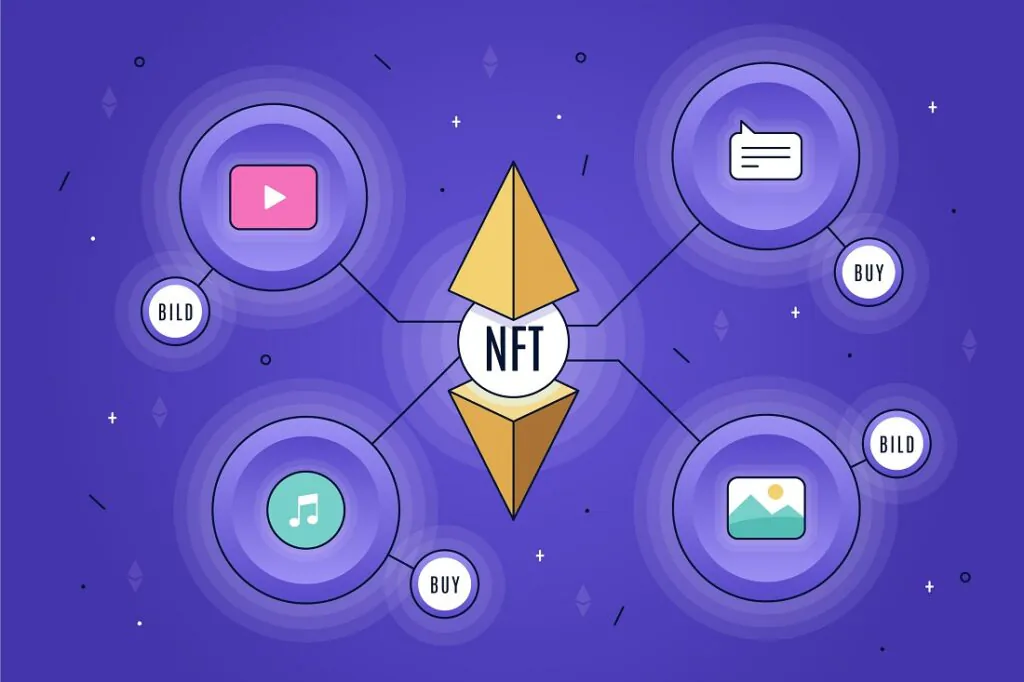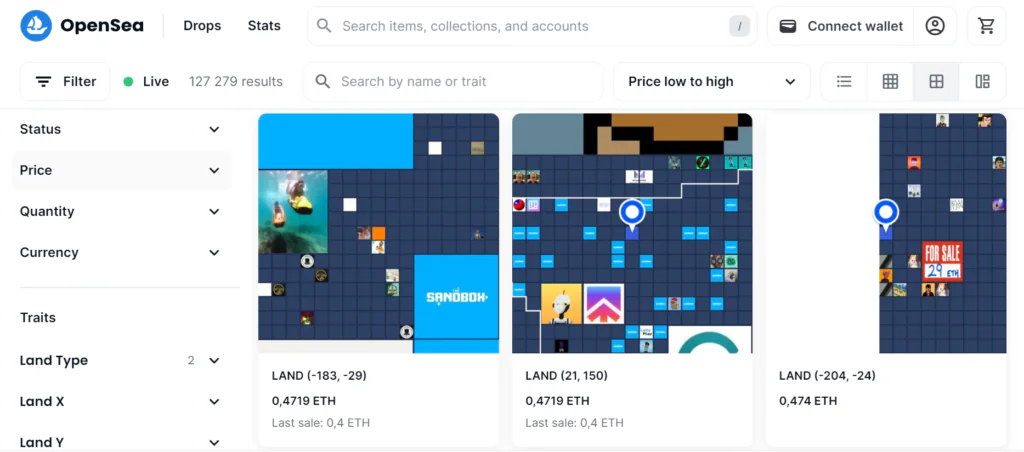Digital Real Estate: Legit or Scam? Worth Invest?

In the digital age, the conreal estate concepts taken on a new dimension. Digital real estate, particularly in the form of Non-Fungible Tokens (NFTs) and virtual lands, is revolutionizing the way we perceive ownership and investment. This article explores the fascinating realm of digital real estate, its potential, and how to navigate this emerging market.
Table of Contents
What is Digital Real Estate?
In the broadest sense, digital real estate refers to any space online space that used for commercial or personal purposes. This concept has evolved significantly over the years, expanding from domain names and websites to include social media accounts, and now, virtual lands and properties in the form of Non-Fungible Tokens (NFTs) within various metaverses.
Traditional Digital Real Estate
The earliest forms of digital real estate were domain names and websites. Domain names, the unique addresses where internet users could find a particular website, were the first type of digital property that could be bought and sold. Websites, on the other hand, were like the buildings on these digital lands. They could be developed and monetized through various means such as advertising, e-commerce, subscription services, or affiliate marketing.
Social media accounts also became a form of digital real estate with the rise of platforms like Facebook, Twitter, and Instagram. These accounts, particularly those with large followings, could be used to generate income through sponsored posts, partnerships, and advertising.
Modern Digital Real Estate
The advent of blockchain technology and the rise of NFTs have given birth to a new form of digital real estate: virtual lands and properties within various metaverses. These virtual properties exist within specific virtual worlds and can be bought, sold, and traded much like physical real estate.
Owners of these virtual properties can develop them by building virtual structures, creating experiences, or using the space for advertising. Some virtual properties even generate passive income for their owners through various mechanisms within their respective virtual worlds.
Digital real estate encompasses a wide range of online properties, from domain names and websites to social media accounts and virtual lands. As technology continues to evolve, the concept of digital real estate is likely to expand and offer new opportunities for investment and development.
The Evolution of Digital Real Estate

The journey of digital real estate has been a fascinating one, marked by the evolution of the internet and the advent of new technologies. From domain names to virtual lands, each phase of this evolution has expanded the boundaries of what constitutes digital real estate.
The Early Days: Domain Names
The concept of digital real estate originated with the advent of the internet. Domain names, the unique addresses where internet users could find a particular website, were the first type of digital property that could be bought and sold. This led to the “dot-com boom” of the late 1990s, where domain names were traded for astronomical prices.
The Rise of Websites and Blogs
As the internet matured, websites and blogs became the new hot properties in digital real estate. These platforms allowed individuals and businesses to share information, sell products or services, or express themselves. The development and monetization of these platforms led to the rise of web development and content management systems like WordPress.
The Social Media Era
The mid-2000s saw the rise of social media platforms like Facebook, Twitter, and Instagram. These platforms gave birth to a new form of digital real estate: social media accounts. These accounts, particularly those with large followings, could be used to generate income through sponsored posts, partnerships, and advertising.
The Advent of Virtual Worlds
The most recent evolution in digital real estate has been the advent of virtual worlds and NFTs. Platforms like Decentraland, Cryptovoxels, and Somnium Space offer virtual lands that users can buy, sell, or develop. These virtual lands can be used to create anything from virtual homes and businesses to entire communities, opening up a whole new world of possibilities for digital real estate.
Here’s an updated chart summarizing the evolution of digital real estate:
| Era | Type of Digital Real Estate | Key Features |
|---|---|---|
| Early Internet (Late 1990s) | Domain Names | Short, memorable names with popular keywords were highly valued. |
| 2000s | Websites and Blogs | Rise of web development and content management systems like WordPress. |
| Mid-2000s | Social Media Accounts | Businesses recognized the value of a strong social media presence, leading to the rise of social media marketing. |
| Late 2010s – Present | Virtual Worlds (NFTs) | Platforms like Decentraland, Cryptovoxels, and Somnium Space offer virtual lands that users can buy, sell, or develop. |
| Future | ??? | With advancements in technology like virtual reality and blockchain, the possibilities for digital real estate are virtually limitless. |
As we look towards the future, it’s clear that digital real estate is poised for even more growth and evolution. With advancements in technology like virtual reality and blockchain, the possibilities for digital real estate are virtually limitless.
Digital Real Estate Investing
Investing in digital real estate is a modern approach to wealth creation that has gained significant traction in recent years. This form of investment involves the acquisition, development, management, and sale of digital properties with the aim of generating profit.
The Basics of Digital Real Estate Investing
At its core, digital real estate investing is similar to traditional real estate investing. The primary goal is to buy a property at a low price, increase its value, and then sell it at a higher price or use it to generate income. The difference lies in the type of property involved – instead of physical properties like houses or land, digital real estate investing deals with virtual properties like websites, domain names, social media accounts, and virtual lands.
Potential Returns from Digital Real Estate Investing
The potential returns from digital real estate investing can be substantial. For instance, a well-developed and monetized website can generate a steady stream of income through advertising, e-commerce, subscription services, or affiliate marketing. A strategically chosen domain name can appreciate in value over time and be sold for a profit. A popular social media account can be monetized through sponsored posts and partnerships. A well-located virtual land can be developed and rented out for virtual events or experiences.
Risks Involved in Digital Real Estate Investing
However, like any form of investment, digital real estate investing comes with its own set of risks. The value of a digital property can fluctuate due to various factors such as changes in market trends, technological advancements, and shifts in user behavior. There’s also the risk of cyber threats like hacking and data breaches. Therefore, it’s crucial for digital real estate investors to stay updated with the latest developments in the digital world and implement proper security measures.
Comparing Digital Real Estate Investing to Traditional
While there are similarities between digital and traditional real estate investing, there are also key differences. Digital real estate investing typically requires less capital to start with, offers greater flexibility, and has the potential for higher returns due to the global reach of the internet. However, it also requires a good understanding of digital trends and technologies, and may involve risks that are unique to the digital world.
| Aspect | Digital Real Property | Traditional Real Estate Investing |
|---|---|---|
| Initial Capital | Typically requires less initial capital. | Usually requires a significant amount of initial capital. |
| Flexibility | High flexibility due to the virtual nature of the properties. | Less flexibility due to physical constraints and regulations. |
| Potential Returns | Potential for high returns due to the global reach of the internet. | Returns can be substantial but are often localized and dependent on physical factors. |
| Knowledge Required | Requires understanding of digital trends and technologies. | Requires understanding of local real estate market and regulations. |
| Risks | Risks include changes in digital trends, technological advancements, and cyber threats. | Risks include property damage, market fluctuations, and regulatory changes. |
How Does Digital Real Estate Work?
The world of digital real estate, particularly in the context of NFTs and virtual worlds, operates on a unique set of principles and mechanisms. It involves the buying, selling, and managing of virtual properties, all underpinned by blockchain technology.
Buying Digital Real Estate

Purchasing digital real estate in the form of NFTs typically involves a blockchain-based marketplace. Platforms like OpenSea, Decentraland, and Voxels are popular places where virtual lands and properties are bought and sold. These purchases are made using cryptocurrencies, with Ethereum being the most commonly used.
Developing Digital Real Estate
Once a piece of virtual land is purchased, it can be developed much like physical real estate. Owners can build virtual structures, create experiences, or use the space for advertising. The development can be done using various tools provided by the respective virtual world or platform. Some virtual worlds also allow for the creation of virtual businesses, events, or communities, providing additional avenues for monetization.
Selling and Renting Digital Property
Selling or renting out digital property also takes place through various online platforms. Virtual properties can be listed for sale or rent on the same marketplaces where they are bought. The price can be set based on various factors such as location, size, development, and demand within the virtual world.
The Role of Blockchain Technology

Blockchain technology plays a crucial role in the functioning of digital real estate. It ensures the security, transparency, and immutability of transactions. Each piece of digital real estate is represented as an NFT on the blockchain, which certifies its uniqueness and ownership. This allows for the secure buying, selling, and trading of virtual properties.
In conclusion, the workings of digital real estate involve a unique blend of traditional real estate principles and digital technologies. Understanding these workings is key to navigating the digital real estate market and making the most of the opportunities it offers.
Digital Real Estate for Beginners
Entering the world of digital property can seem daunting for beginners, but with the right knowledge and strategies, it can be a rewarding venture. Here’s a step-by-step guide on how to get started in digital real estate.
Step-by-Step Guide to Digital Real Estate
| Step | Action | Description | Tips |
|---|---|---|---|
| Step 1 | Understand Digital Real Estate | Familiarize yourself with the concept of digital real estate. Learn about the different types of digital properties, including websites, domain names, social media accounts, and virtual lands. | Start with online resources, webinars, and courses to gain a solid understanding. |
| Step 2 | Research the Market | Conduct thorough research on the digital real estate market. Understand the trends, dynamics, and factors that affect the value of digital properties. | Use market analysis tools and follow industry experts to stay updated with market trends. |
| Step 3 | Choose the Right Platform | Select a platform that aligns with your investment goals. There are various online marketplaces for buying and selling different types of digital real estate. | Ensure to choose a platform that is reputable, secure, and user-friendly. |
| Step 4 | Make Your First Purchase | Once you’ve chosen a platform, you can make your first purchase. Start small and gradually increase your investment as you gain more experience and confidence. | Consider starting with a less expensive property to understand the process and dynamics. |
| Step 5 | Develop and Manage Your Property | After purchasing a digital property, the next step is to develop and manage it to increase its value or generate income. | This could involve creating content, improving SEO, building virtual structures, or creating virtual experiences. |
| Step 6 | Sell or Monetize Your Property | Once your digital property has increased in value, you can choose to sell it for a profit or monetize it to generate income. | This could involve selling the property on an online marketplace, displaying ads, offering subscription services, or renting out virtual space. |
| Step 7 | Stay Updated | The digital real estate market is dynamic and constantly evolving. Stay updated with the latest trends, technologies, and market dynamics. | Follow industry news, join online communities, and attend webinars or conferences to stay informed. |
Digital Real Estate Examples
Digital real estate encompasses a wide range of online properties. Here are a few examples of digital real estate and how they have been successfully utilized or invested in.
Domain Names
Domain names are one of the earliest forms of digital real estate. A prime example of successful domain name investment is the sale of the domain name “Business.com”. Purchased for $150,000 in 1997, it was later sold for $7.5 million in 1999, demonstrating the potential returns from investing in domain names.
Websites

Websites are another form of digital real estate that can be highly profitable. For instance, “Mashable”, a digital media website started by Pete Cashmore in 2005, was sold for around $50 million in 2017. The website was monetized through advertising, sponsored content, and affiliate marketing.
Social Media Accounts

Social media accounts, particularly those with large followings, can also be considered a form of digital real estate. Kylie Jenner’s Instagram account, for example, is estimated to earn her over $1 million per sponsored post due to her massive following.
Virtual Lands
The most recent form of digital property is virtual lands within various metaverses. For instance, a plot of land on the virtual world “Decentraland” was bought for around $215,000 in 2020. The buyer plans to develop the land and use it for virtual events, demonstrating the potential of virtual lands as a form of digital real estate.
These examples illustrate the wide range of possibilities within the realm of digital real estate. Whether it’s domain names, websites, social media accounts, or virtual lands, each form of digital real estate offers unique opportunities for investment and monetization.
Is Digital Real Estate a Scam?

Like any investment opportunity, digital real estate has its share of scams and fraudulent activities. However, it’s important to note that digital real estate, as a concept, is not a scam. It’s a legitimate form of investment that has been profitable for many. The key is to be aware of potential scams and know how to avoid them.
Common Misconceptions and Fears
Some people may view digital real estate as a scam due to misconceptions or fears. For instance, the idea of buying “virtual” property that doesn’t physically exist can seem strange or risky to some. However, just like any digital asset, such as cryptocurrencies or digital art, the value of digital real estate lies in its uniqueness, scarcity, and the demand for it in the digital world.
Potential Scams in Digital Property
While digital real estate is a legitimate investment, there are potential scams that investors should be aware of. These can include fraudulent listings, where a scammer lists a digital property for sale that they don’t own or that doesn’t exist. There can also be scams involving fake platforms or marketplaces that are designed to steal money or personal information.
How to Avoid Scams
To avoid scams in digital real estate, it’s important to do thorough research and due diligence. This includes researching the platform or marketplace where you plan to buy or sell digital real estate, checking the authenticity of listings, and being cautious of deals that seem too good to be true. It’s also advisable to use secure payment methods and protect your personal information.
So. Is Digital Real Estate Legit?

Yes, digital real estate is a legitimate form of investment. Just as physical properties can be bought, sold, and leased, so too can digital properties. The value of digital real estate, much like physical real estate, is determined by factors such as location (or in the digital world, traffic and users), uniqueness, and demand.
Evidence of Legitimacy
The legitimacy of digital property is evident in its widespread recognition and use. Domain names and websites have been bought and sold for decades, and more recently, virtual lands and properties in various metaverses have become hot commodities. Major companies and investors are investing in digital real estate, further validating its legitimacy.
For instance, in 2021, a virtual real estate plot in the digital world “Decentraland” sold for a record-breaking $900,000. Similarly, the virtual world “Cryptovoxels” has seen plots of land sell for six-figure sums.
Legal Aspects of Digital Real Estate
Digital real estate operates within the legal frameworks of various jurisdictions. For instance, domain names are regulated by ICANN (Internet Corporation for Assigned Names and Numbers), a non-profit organization that oversees the global domain name system.
In the case of virtual lands and properties represented as NFTs, they are governed by the terms of the respective blockchain they exist on. Ownership of these virtual properties is recorded on the blockchain, providing a transparent and immutable record of transactions.
However, it’s important to note that laws and regulations regarding digital real estate can vary by country and are still evolving, particularly in the case of virtual lands and NFTs. Therefore, it’s advisable to consult with a legal expert or do thorough research before investing in digital real estate.
In conclusion, digital real estate is a legitimate and increasingly recognized form of investment. As technology continues to evolve and the digital world expands, the potential of digital real estate is set to grow. However, like any form of investment, it’s important to approach digital real estate with knowledge, caution, and due diligence.
Digital Real Estate: The Future of Investing
As we look towards the future, it’s clear that digital real estate is poised to become a significant player in the investment world. With the rise of virtual reality and the metaverse, the potential for growth in this sector is immense.
Conclusion
The world of digital real estate is a dynamic and rapidly evolving landscape. From domain names and websites to social media accounts and virtual lands, digital real estate has come a long way. Today, it represents a significant opportunity for investment and wealth creation in the digital age.
Digital real estate, particularly in the form of NFTs and virtual lands, is redefining the concept of property and ownership. It’s creating new possibilities for investment, development, and monetization. It’s also opening up new avenues for creativity, innovation, and community building in the virtual world.
However, like any form of investment, digital real estate comes with its own set of challenges and risks. It requires a good understanding of digital trends and technologies, a strategic approach to investment, and vigilance against potential scams.
As we continue to navigate the digital age, the importance and potential of digital real estate cannot be overstated. It’s not just about buying and selling virtual properties; it’s about participating in the digital economy, contributing to the virtual community, and shaping the future of the digital world.
Whether you’re a seasoned investor or a beginner, the world of digital real estate offers a wealth of opportunities. So, dive in, explore, learn, and who knows? You might just find your piece of the digital world.